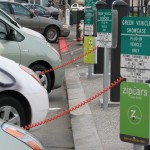 Last year I looked at a project by Highways England to develop roads that charge electric vehicles (EVs) whilst they are driving.
Last year I looked at a project by Highways England to develop roads that charge electric vehicles (EVs) whilst they are driving.
“The potential to recharge low emission vehicles on the move offers exciting possibilities. The government is already committing £500 million over the next five years to keep Britain at the forefront of this technology, which will help boost jobs and growth in the sector. As this study shows, we continue to explore options on how to improve journeys and make low-emission vehicles accessible to families and businesses,” the department said.
Fluctuating demand
It’s a project that will undoubtedly interest the Norwegians, who are the largest market for EVs in the world. The traditional method of charging ones vehicle can result in a substantial surge in demand for electricity, which presents a challenge for the electrical grid.
“We could have big voltage problems, with limited transmission capacity within the distribution system,” says Professor Olav B. Fosso, professor and director of the Energy strategic research area at the Norwegian University of Science and Technology (NTNU).
The Norwegians are fortunate in a sense in that they have large hydropower facilities that allow them to adjust its power supply according to such fluctuations, but that’s a luxury few other countries enjoy, and the energy generated by renewables is largely ill equipped for such work.
With EV numbers small this doesn’t present much of a problem, but the signs are good that growth in the EV market will continue apace.
A further challenge is the varying qualities of EVs themselves. Storage capacity, for instance, is incredibly mixed, whilst most cars have different degrees of charging efficiency. Add in the differing capabilities of charger installations and you have a complex picture.
The need for smarter grids
To tackle the peaks that appear likely as EVs become more widespread, the Norwegians are developing smart grid technology to help their system cope.
Smart grids give consumers much greater insight into how they are using electricity, and offer us the chance to adjust our consumption if doing so will lower our bill.
For instance, this might encourage EV owners to charge their cars at cheaper times, thus spreading the load out throughout the day.
Suffice to say, whilst smart grids do offer numerous potential benefits, their development is not without risks, and there has been resistance to smart meters around the world.
It seems likely, therefore, that whilst developments into smart grids will improve, projects such as the charging road highlighted earlier will offer greater potential to ensure the rise of EVs doesn’t topple the existing energy infrastructure, at least in the medium-term.
Let me know your thoughts in the comments below.
I think electric vehicles will be fantastic, and hope they come on stream as soon as possible.